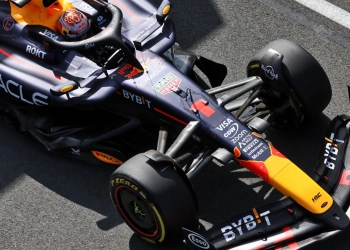The recent takeover of the Force India Formula 1 team "may not be in the best interests of Force India's creditors and stakeholders, and the sport", according to a rival bidder.
Force India entered administration during the Hungarian Grand Prix amid the ongoing personal financial issues endured by long-time co-owner Vijay Mallya.
The administrative process was triggered by Sergio Perez and his associates – who was persuaded to kick-start the development – and the Mexican was backed by a series of other creditors.
It was confirmed earlier this month that a consortium of investors, led by Lance Stroll’s father Lawrence, had acquired the outfit, with its exit from administration planned across the coming weeks.
On Tuesday PJSC Uralkali, on whose board Force India tester and GP3 race winner Nikita Mazepin’s father Dmitry occupies a Non-Executive Director role, issued a lengthy statement.
In it the company explained the process behind the proposal and believes the ultimate agreement that was concluded may not be in the best interests of some parties.
It suggested that some of the timeframes demanded by administrators in which to conclude complex legal matters were not achievable, and that administrators "refused to engage" with its submitted bid.
Full statement from PJSC Uralkali:
On July 27, 2018, upon the application of Brockstone Limited, one of the creditors of Force India, the High Court of Justice of Business and Property Courts of England and Wales issued an Administration order putting Force India into the Administration. The Administration is formal insolvency process during which activities, business and property of Force India are managed by the Joint Administrators: Geoffrey Paul Rowley and Jason Daniel Baker (both of FRP Advisory LLP) (the “Administrators”). Under English law, the objectives of the Administrators’ activities are to rescue Force India as a going concern or, if that is not possible, to achieve a better result for the company’s stakeholders as a whole.
Uralkali assembled a team of professionals (including lawyers, accountants, insolvency experts and a Formula 1 specialist) to prepare and submit a competitive bid for Force India, which was led by Uralkali`s independent director Paul J. Ostling.
On August 3, 2018, Uralkali submitted a proposal comprising two options:
1) to rescue Force India as a going concern and to acquire a controlling stake in Force India to safeguard Force India from insolvency; and
2) to acquire the business and assets of Force India from the company in administration to enable the business to continue as a going concern in a new vehicle under new ownership.
Both options proposed sufficient funding to satisfy claims of all creditors in full and included an undertaking to provide significant working capital and new investment program over a
Over the course of the bidding process and discussions with the Administrator, Uralkali insisted on a transparent and fair process to ensure equal opportunities for each bidder. In particular, Uralkali proposed that the bidding process be conducted by way of the submission in sealed envelopes of best and final bids to be opened in the presence of appointed representatives of the interested bidders. However, this proposal was rejected by the Administrators.
Moreover, on August 4, 2018 (a Saturday), the Administrator informed Uralkali that it would only consider the proposed rescue option if Uralkali provided, by 4pm on August 6, 2018 (i.e. in less than one business day), a binding agreement with Force India`s shareholders to acquire their stakes in Force India. The Administrator also acknowledged that the rescue option would require a consent from 13 Indian banks, who are advised by TLT LLP, pursuant to the freezing injunction imposed by the Business and Property Court of England and Wales relating to the shareholding in Force India. The Administrator set noon London time on August 17, 2018 as a deadline for obtaining such consent (i.e. only two weeks after the date of the Administrator`s letter). Despite Uralkali team’s best efforts, the above deadlines were not achievable.
Upon our discussions with the shareholder representatives, it became apparent to us that the rescue option (at least on the conditions and within the timeframes put forward to us by the Administrator and consistent with our own code of integrity) was not achievable due to the complexity of legal structure, the extended period of time required to obtain consents of the 13 Indian banks and to obtain approval of a UK court for an amendment to the freezing injunction. Uralkali submitted a restated proposal on August 6, 2018 which, due to the above reasons, no longer offered a rescue option but set out a very attractive proposal to purchase business and assets of Force India on a going concern basis.
In addition, Urakali reiterated its commitment to offer a cash consideration sufficient to pay Force India`s creditors in full and to provide additional cash consideration which may be distributed by the administrator to Force India`s stakeholders in accordance with applicable laws. Uralkali also offered to assume a number of what appeared to be questionable last-minute claims against Force India communicated to Uralkali in the hours before the deadline for submission of the final bid.
Moreover, in the spirit of good faith cooperation and commitment to ensuring the future success of the team and financial stability for its employees following Uralkali`s acquisition of the Force India`s assets and business, Uralkali`s final bid contained proposals in respect of a development plan for the team and incentive plan for its employees.
Following the submission of our proposal, the administrator refused to engage with Uralkali team, did not reply to phone calls and emails and communicated with Uralkali in a single email following close of business on August 7, 2018 that it had entered into an exclusivity arrangement with another bidder regarding a proposal to rescue the company.
Despite expiration of the deadline set by the Administrator, no rescue plan was submitted to the court for approval, which confirmed Uralkali’s view that the rescue option was not achievable in the timeline and under conditions proposed by the Administrator. Under these circumstances, it is surprising that no attempt was made by the Administrator to engage with Uralkali with respects to its bid for the assets and business of Force India.
Uralkali always emphasised its desire to bring transparency, proper corporate governance and financial stability to Force India. In this connection, Uralkali considers that the process conducted by the Administrator may not be in the best interests of Force India creditors and other stakeholders, and the sport in general.”
FRP Advisory, the company that oversaw Force India's administration, responded to Urakali's claims, insisting that all bidders were given equal treatment.
“All bidders were given equal opportunity to submit the best deal for Force India," read a statement from the joint administrators.
"Throughout, we (the Joint Administrators) have closely followed our statutory duties and objectives as administrators and had the advice of experienced legal counsel.”






